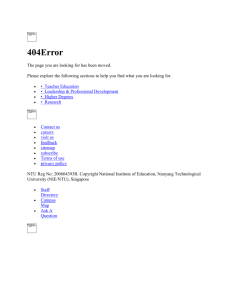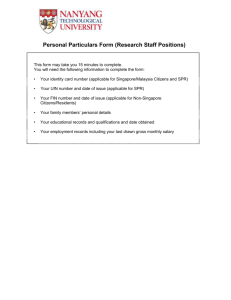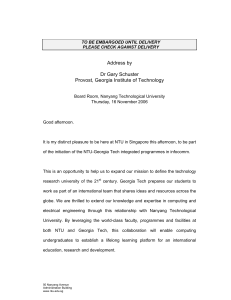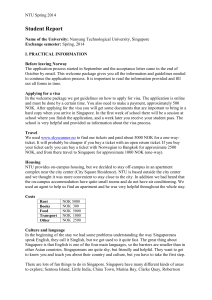Student report Nanyang Technological University (NTU) Spring 2015.
advertisement
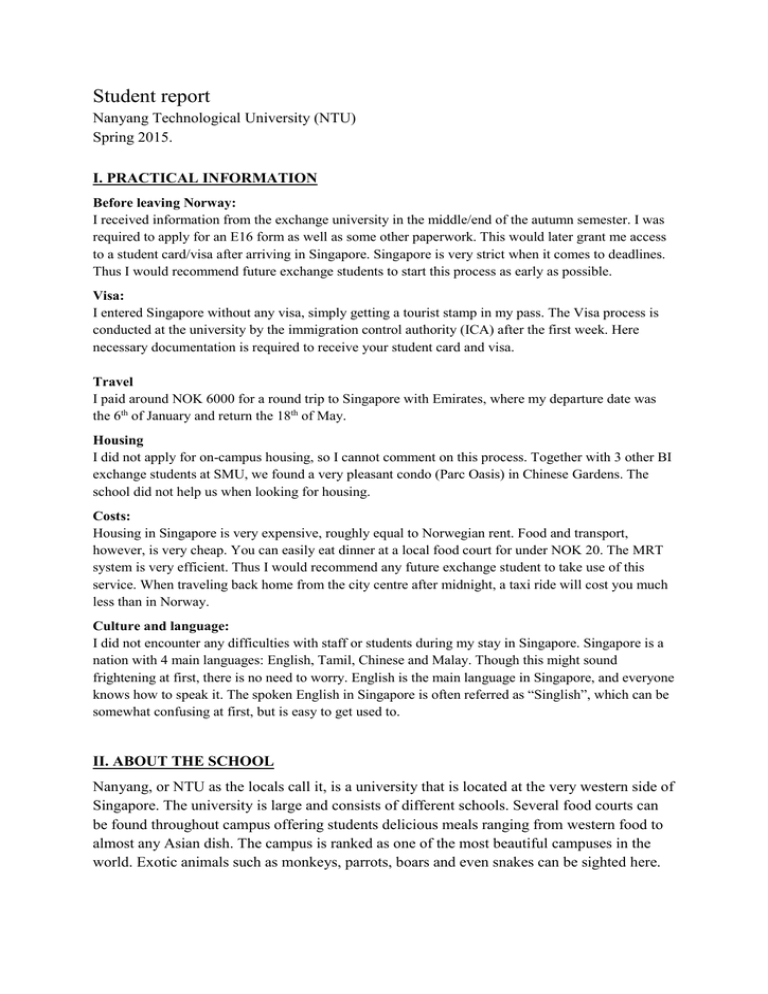
Student report Nanyang Technological University (NTU) Spring 2015. I. PRACTICAL INFORMATION Before leaving Norway: I received information from the exchange university in the middle/end of the autumn semester. I was required to apply for an E16 form as well as some other paperwork. This would later grant me access to a student card/visa after arriving in Singapore. Singapore is very strict when it comes to deadlines. Thus I would recommend future exchange students to start this process as early as possible. Visa: I entered Singapore without any visa, simply getting a tourist stamp in my pass. The Visa process is conducted at the university by the immigration control authority (ICA) after the first week. Here necessary documentation is required to receive your student card and visa. Travel I paid around NOK 6000 for a round trip to Singapore with Emirates, where my departure date was the 6th of January and return the 18th of May. Housing I did not apply for on-campus housing, so I cannot comment on this process. Together with 3 other BI exchange students at SMU, we found a very pleasant condo (Parc Oasis) in Chinese Gardens. The school did not help us when looking for housing. Costs: Housing in Singapore is very expensive, roughly equal to Norwegian rent. Food and transport, however, is very cheap. You can easily eat dinner at a local food court for under NOK 20. The MRT system is very efficient. Thus I would recommend any future exchange student to take use of this service. When traveling back home from the city centre after midnight, a taxi ride will cost you much less than in Norway. Culture and language: I did not encounter any difficulties with staff or students during my stay in Singapore. Singapore is a nation with 4 main languages: English, Tamil, Chinese and Malay. Though this might sound frightening at first, there is no need to worry. English is the main language in Singapore, and everyone knows how to speak it. The spoken English in Singapore is often referred as “Singlish”, which can be somewhat confusing at first, but is easy to get used to. II. ABOUT THE SCHOOL Nanyang, or NTU as the locals call it, is a university that is located at the very western side of Singapore. The university is large and consists of different schools. Several food courts can be found throughout campus offering students delicious meals ranging from western food to almost any Asian dish. The campus is ranked as one of the most beautiful campuses in the world. Exotic animals such as monkeys, parrots, boars and even snakes can be sighted here. Course registration: You apply for certain courses before arriving in Singapore. However, you will most likely only receive one or two of the courses you applied for. The first two weeks of the semester is called the “add-drop” period. Here students attend different classes, trying to find courses that suit them well. I would strongly encourage future exchange students to talk to the student office in the S3 building should you encounter difficulties with your schedule. The staff here are very friendly, and managed to grant me a course with a long waitlist simply for showing up and asking for help. Academic calendar: Arrival date: 7th January First day of the semester: 12th January Last day of classes: End of April Examination period: 27th April – 6th of May Any special events/holidays: Chinese new year (end of February) Arrival: Upon arriving in Singapore, NTU arranged an orientation ceremony that took place the week before classes commenced. I managed to miss out on this event, thus cannot provide any additional information regarding this. International office: The international office was very helpful and efficient. I received sufficient and relevant information in the emails sent out by the international office. Promoting BI and Norway: Every exchange student was invited to represent his or her school on the exchange fair. I was unfortunately away travelling this day, and was not able to represent BI and Norway. Social activities: On my NTU email, I received weekly information for upcoming social activities taking place on and off campus. I participated on some of the events including the BBQ party and the city tour. III. ACADEMICS In the classroom: In terms of study structure, I found NTU to be similar to what is found for my program at BI, the BBA program. Lectures take place in smaller classrooms, encouraging students to participate. Participation counts as a part of your grade. You also face weekly projects, presentations and midterms, plus the occasional popup quiz. This way you are always “kept on your toes” as there is constantly something to do. The competition for good grades is fierce. Local students spend much more time studying than BI students. As grades follow a bell curve distribution, getting a top grades will require more effort than at BI. Course Material: Most of the course material was handed out by the professor during lectures or uploaded on the course website a day or two before. None of my professors required us to purchase books for the courses. A solid understanding of the slides was expected though. Exams: The exams were based on the information given on the slides. At the last lecture of every class, the professors give out detailed information regarding the exam. This includes what topics will be asked and how many questions for each given topic. This really surprised me, as I did not receive similar treatment at BI. This made the preparation period for the exams somewhat less stressful, as I did not have to read on the entire curriculum. Having said that, the exams at NTU was intense. Exams are only two hours, and are often very long and demanding. The exam itself is very stressful, as you are given little time to complete it. This differs very much from BI, where we are given up to 5 hours to complete an exam. Time management is crucial for success here. Library and facilities: NTU is very proud of its facilities. Several libraries can be found throughout campus, as well as newsrooms and study rooms. I was very satisfied with this, as I always found a place to study during the exam period. Description of courses taken: Course code & name Master/ Bachelor Exam form Prerequisites Approved as Comments BM2503 – Marketing Relationships Bachelor 2-hour written exam None Mandatory Easy. HE303/HE3003 – The Chinese Economy Bachelor 2,5 hour written exam None Mandatory By far the most interesting course I have ever taken. BF2201 – Investments Bachelor 2 – hour written exam None Elective Medium difficulty BF3207 – Alternative investments Bachelor 2- hour written exam BF2201 – Investments Elective Very interesting curriculum. Fierce competition for good grades. Sum up: Looking back at my time in Singapore and NTU, I will rank it as one of the most interesting and fascinating periods of my life. I absolutely loved staying in Singapore. People are very friendly, the food is amazing, and the courses I choose at school were very good. I was highly satisfied with all the professors I had at NTU who all gave me a challenging, but yet interesting, time in school. I met people from all over the world whom I intend to keep in contact with for the rest of my life. I also got to visit exotic destinations throughout South-East Asia. I will strongly recommend any future exchange student from BI to choose Singapore and NTU. Should you have any questions regarding the school or the city, do not hesitate to contact me through the International Office.
